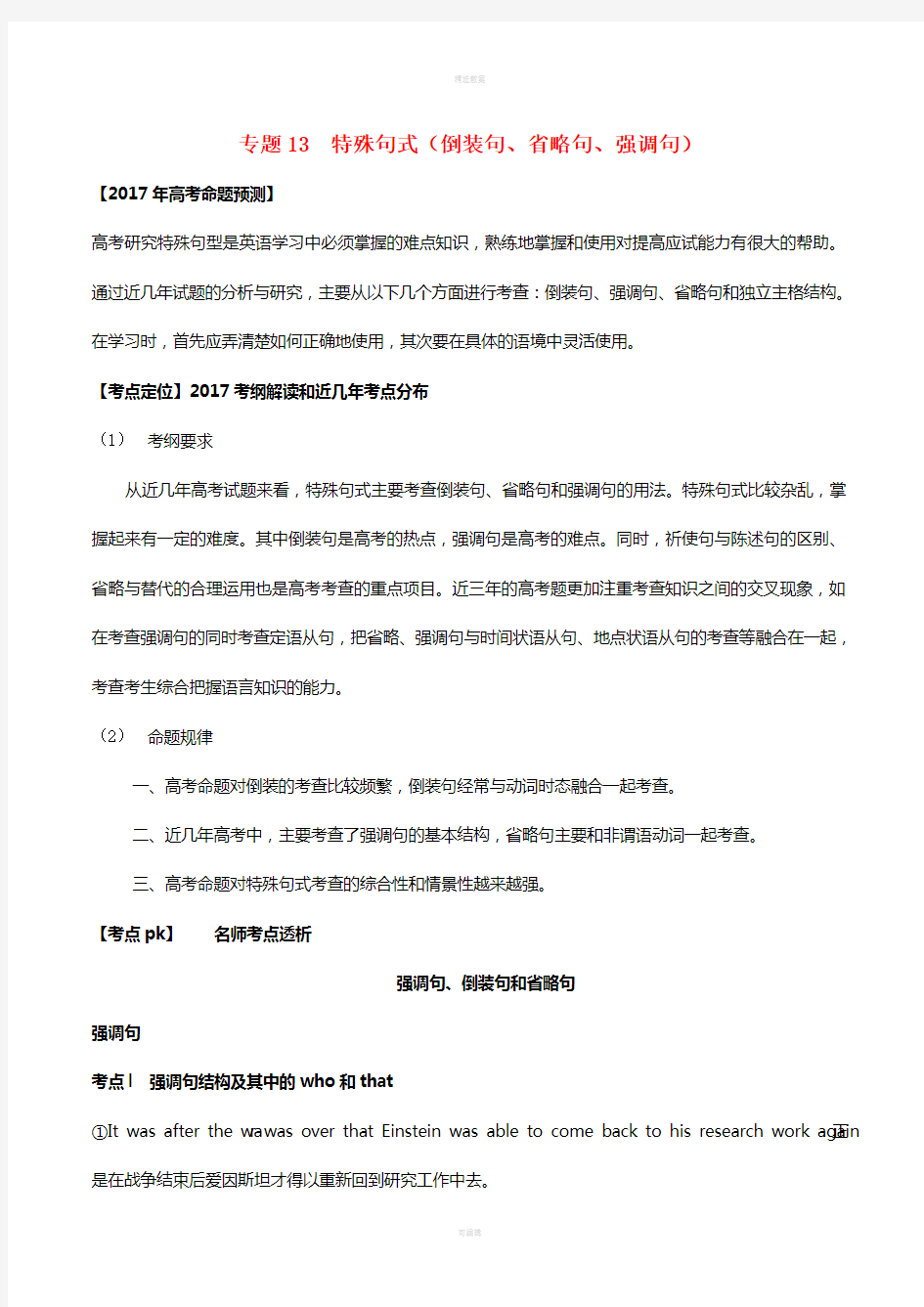高考英语(精讲+精练+精析)专题13 特殊句式(倒装句、省略句、强调句)试题(含解析)1


专题13 特殊句式(倒装句、省略句、强调句)
【2017年高考命题预测】
高考研究特殊句型是英语学习中必须掌握的难点知识,熟练地掌握和使用对提高应试能力有很大的帮助。通过近几年试题的分析与研究,主要从以下几个方面进行考查:倒装句、强调句、省略句和独立主格结构。在学习时,首先应弄清楚如何正确地使用,其次要在具体的语境中灵活使用。
【考点定位】2017考纲解读和近几年考点分布
(1)考纲要求
从近几年高考试题来看,特殊句式主要考查倒装句、省略句和强调句的用法。特殊句式比较杂乱,掌握起来有一定的难度。其中倒装句是高考的热点,强调句是高考的难点。同时,祈使句与陈述句的区别、省略与替代的合理运用也是高考考查的重点项目。近三年的高考题更加注重考查知识之间的交叉现象,如在考查强调句的同时考查定语从句,把省略、强调句与时间状语从句、地点状语从句的考查等融合在一起,考查考生综合把握语言知识的能力。
(2)命题规律
一、高考命题对倒装的考查比较频繁,倒装句经常与动词时态融合一起考查。
二、近几年高考中,主要考查了强调句的基本结构,省略句主要和非谓语动词一起考查。
三、高考命题对特殊句式考查的综合性和情景性越来越强。
【考点pk】名师考点透析
强调句、倒装句和省略句
强调句
考点l 强调句结构及其中的who和that
①It was after the wa r was over that Einstein was able to come back to his research work again.正是在战争结束后爱因斯坦才得以重新回到研究工作中去。
②It was in front of the bank that the old lady was robbed.那位老太太是在银行的前面被抢劫的。
③It is when he got back that he knew what had happened.他回来后才知道所发生的情况。
④It was the goat’s eyes that he had seen in the darkness.他在黑暗中看到的就是这只山羊的眼睛。
特别提示
强调句中的主谓一致性:当强调主语时,其后的谓语动词
应与主语一致,即人称和数要一致。如:
①It is my mother who cooks every day.每天煮饭的是我妈妈。
②It is he who is wrong.是他错了。
考例:If nature does not provide man with the necessary material, it is the laboratory ____ he will turn to for it.
A.where B.that C.which D.what
考点二强调状语部分
①It was before he went to London that he had learned English for three years.他在去伦敦之前已经学了三年英语。(强调时间)
②It was where you have questions that you’d better make a mark.最好在你有疑问的地方做个记号。(强调地点)
③n was because she was ill that she didn’t come to the party.她没来参加聚会是因为她病了。(强调原因)
④It is as the Party tells us that we must do.我们必须做的就是听从党的安排。(强调方式)
⑤It is as long as yo u promise to be back before 8:00 that you can go out.只要你保证八点以前回来你就可以出去。(强调条件)
①It wasn’t until I got off the bus that I realized it.直到下车我才意识到这一点。(强调句)
②Not until I got off the bus did I realize it.直到下车我才意识到这一点。(倒装句)
考例:It was not until midnight ____ we got home because of traffic jams.
A.that B.when C.while D.as
考点3 强调句的疑问句
1.一般疑问句。结构为:Is/Was it+被强调部分+that/who+句子其他成分?如:
Was it during the Anti.Japanese War that he died?他是在抗日战争期间去世的吗?
2.特殊疑问句。结构为:特殊疑问词(what/Who/when/Why/
Where/How)+is/was it+that/who+句子其他成分?如:
Why is it that smoking is not allowed here?为什么这儿不允许吸烟? ‘
考点4 强调句与主语从句、定语从句和状语从句的辨析
2.定语从句的引导词(即关系代词和关系副词)在从句的使用过程中较为丰富,如who,that,which,whose,when,where,why等,与充当先行词的名词或代词存在修饰与被修饰的关系;而强调句中的引导词只有who和that,强调人时,用who或that,强调其他时,只用that,且与被强调的部分不存在修饰与被修饰的关系。如:
①It was 2009 when she graduated from the senior high schoo1.
那是2009年,她高中毕业的时候。(定语从句)
①It is three years since he joined the army.自他参军以来已有三年了。
②It is many years since he smoked.他没有吸烟已有好多年了。
(2)It is/will(not)be+时间段+before从句。表示”要过多久(不久)才……”,before从句后的谓语动词多用一般现在时。如:
It won’t be long before you reach your goal.你离成功不远了。
(3)It Was+时间段+before从句。表示”过了多久才……”。before从句后的谓语动词多用一般过去时。如:
It was four hours before he finished the work,过了四小时他才完成工作。
考例:It is_________ Tom often breaks the school roles_________ makes his teacher unsatisfied with him.
A.what:that B.that;what
C.that;that D.which ;that
【答案】C
考点5 谓语动词的强调
强调句“It is/was…that…”一般不强调谓语动词,如果要强调谓语,用助动词do,does或did。如:The family did manage to send him to a technical schoo1.家里的确设法让他上技术学校。
倒装句
考点1 全部倒装
Now comes your turn!该你了
3.当地点类介词短语位于句首且后有不及物动词be,come,sit,live,stand,lie,exist等时,常用全部倒装。如:
On the ground lay an old man,who was dying.地上躺着一位老人,奄奄一息。
4.such作表语,置于句首,表示“这样的人/事物;上述的人/事物”。be动词须与后面的主语保持一致。如:
Such is their decision.他们的决定就是这样。
考例:At the meeting place of the Yangtze River and the Jialing River______, one of the ten largest cities in China.
A. lies Chongqing
B. Chongqing lies
C. does lie Chongqing
D. does Chongqing lie
【答案】A
【解析】考查倒装。表示方位的地点状语提前,句子完全倒装,所以选A项。
考点2 部分倒装
只把助动词/系动词/情态动词提到主语前面,叫部分倒装。主要有:
情况加以肯定,它的主语与上文的主语相同,so相当于indeed,certainly。如:
①Mary has learned by heart 200 words,and So have I.玛丽已经记住了200个单词,我也是这样。
②——The girls study hard.这些女孩学习刻苦。
——so they do.她们的确如此。
3.在以never,seldom,not only,rarely,scarcely,in no way等否定或半否定词开头的句中用部分倒装。如:
Little do I dream of seeing such wonderful scenery.我想象不到会看到这样美妙的景色。6.在hardly…when,no sooner…than,not until句型中,主句须部分倒装。如:Hardly had he arrived when it began to snow.他一到,天就下起雪来了。
7.as引导的让步状语从句结构为:形容词/名词/动词+as+主语+谓语。如:
8.在省略了if的虚拟条件句中,were,had或should置于句首。如:
Were I in your position,1 would not go.我要是在你的位置上,我是不会去的。
9.however,no matter how引导的让步状语从句。如:
However hard he worked,he couldn’t solve the problem.不管多努力,他就是解决不了那个问题。
考例:1.We laugh at jokes,but seldom ______ about how they work.
A.we think B.think we
C.we do think D.do we think
2.Never______ Lisa would arrive but she turned up at the last minute.
A.did we think B.have we thought
C.we thought D.we have thought
【答案】A
3.Not until he left his home ______ to know how important the family was for him.
A did he begin
B had he begun
C he began
D he had begun 【解析】考查倒装句。句意:直到离开家,他才开始意识到这个家对他来说是何等的重要。:not until引导的从句置于句首时,主句需用部分倒装。主从句的动作基本同时发生,故用一般过去时。
省略句
考点省略句的几个考察要点
考点省略句的几个考查要点英语中,有时为了避免重复,往往省去一个词或一些成分,
这种语法现象称为省略。主要考查点有:
1.简单句的省略。
祈使句省略主语you;某些句子结构省略谓语;部分问句同时省略主谓语;疑问句的答语省略;感叹句的省略;年龄和钟点的省略等。如:
2.比较结构的省略。
在”the+比较级,the+比较级”结构中,可以省略be;由than和as引导的比较句式中的省略。如:
①The sooner(you do it),the better(it will be).(你做得)越快,(结果就会)越好。
②The longer the wire(is),the greater the resistance(is).导线越长,电阻就越大。
3.主从复合句中的省略。
(1)宾语从句中,连词that常省略,但当多个宾语从句并列时,只能省略第一个。如:
①If so(=If it is so),you must go back and bring it here.如果是这样的话,你必须回去把它拿来。
②Look out for cars when(y ou are)crossing the street.过街时当心车辆。
(3)定语从句的省略。作宾语的关系代词的省略或省略到用分词作定语。如:
The car(which/that)his father gave him as a birthday present was stolen.他父亲作为生日礼物送给他的那辆汽车被盗了。
(4)在含有were,had,should的虚拟条件句中if的省略。在这种情况下若if省略,常将were,had,should等提到句首,主谓部分倒装。如:
Were I a bird,I could fly.如果我是一只鸟,我就能飞。
考例:1.The school rules state that no child shall be allowed out of the school during the day, ______ accompanied by an adult.
A. once
B. when
C. if
D. unless
【答案】D
2.though ______ to see us,the professor gave us a warm welcome。
A. surprise B was surprised C. surprised D. being surprised
4.not,so,neither,nor的替代性省略。动词believe,do,expect,fear,guess,hope,say,suppose,think等和I’m afraid后面可用替代词so或not来避免重复前面提到的内容。表示肯定意义时,以上动词都可与so搭配;但表示否定意义时,hope与guess只用I hope not和I guess not 的形式,而think,believe,suppose等词可有两种形式,即:I think not和
I don’t think so。如:
——Do they mind you smoking th ere?你在那儿抽烟,他们介意吗?
——I don’t think so/I think not.我想不会。
【三年高考】14、15、16高考试题及其解析
2016年高考试题
【单项填空】
1.【2016·江苏】34.Not until recently ______the development of tourist-related activities in the rural areas.
A. they had encouraged
B. had they encouraged
